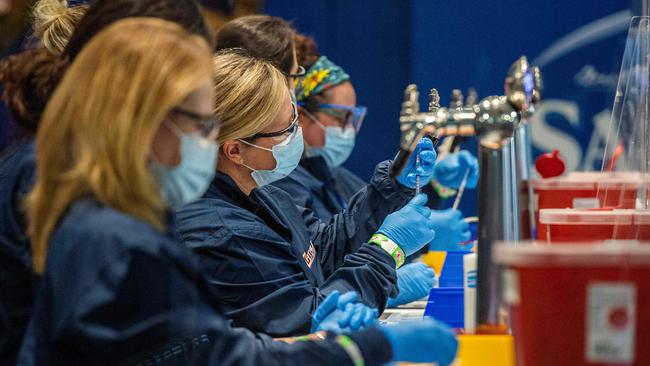How coronavirus vaccine research will help fight cancer
The battle to harness the power of mRNA led to the Pfizer vaccine and now opens the way for more medical breakthroughs

Saving the world was, for Dr Katalin Kariko, always a sideline. After a busy year producing the world’s first, and currently most effective, coronavirus vaccine, she is keen to return to the day job.
“We have very important projects, and many of them were pushed aside due to the pandemic,” she says. Patients, she adds, are waiting.
Those projects – from personalised cancer medicine to curing allergies – have arguably become more important due to what she has done in the past 12 months. Because, today, a lot more people think they will actually work.
In January 2020, Kariko was one of the team at BioNTech, a German pharmaceutical company. They had a technology that they thought could make a fast and simple vaccine. There was a problem, though. This technology, mRNA therapeutics, had never been used for anything before.
For 30 years, Kariko had been one of its leading proponents, arguing that it had the potential to treat a great swathe of diseases. In the past ten years, others had come to agree, and companies had sprung up worth hundreds of millions. None had made a working drug. It had the feelings of a biotech bubble. “I dreamt it would be good for something. I always expected there would be a product. I just didn’t know that I’d live long enough to see it,” says Kariko.
MRNA is the code your DNA uses to send messages. The promise of mRNA drugs is to intercept that process for our own ends. “Imagine you can slip in a stack of papers, containing your own message,” says David Bauer, an RNA researcher at the Francis Crick laboratory in London. “That’s the trick,” he says. “And, of course, that’s the hard part.”
The potential is awesome. Every protein in your body is coded using mRNA. Proteins are what the body uses to make things go right, and what disease uses to make things go wrong. They are the machinery of life. Hack that system and you can do almost anything.
You can produce minuscule quantities of peanut protein to train the bodies of allergic people that it’s safe. Or you can make a personalised cancer vaccine that can find identifying features on the tumour, and get your cells to churn them out. Just as with the COVID-19 vaccine, your body will learn what a cancer cell looks like, make antibodies against it, and attack. So why did it take most of Kariko’s career to make this a reality? One answer is, because the body does not like to be hacked.
“We are trying to add RNA from the outside,” she says. “For every organism, nucleic acid from the outside is dangerous.” Solving this problem has not been trivial. Scientists have had to swap out one of the components of the RNA into something chemically different, but functionally the same. They have had to add in and jumble up letters so that it no longer looks like a telltale biological sequence – but so that it still makes the right proteins.
It has been hard, and slow – until this year. “This has been a good example of what happens when the cautious pace of development, that is normal and reasonable in pharmaceutical arenas, gets thrown aside when it needs to,” says Bauer.
Somehow, just in time, all the pieces of the puzzle came together. In Europe, BioNTech showed that this improbable and unproven approach could make a vaccine against coronavirus, and they partnered with the pharmaceutical giant Pfizer to distribute it. In America Moderna did the same.
After many false starts, the age of mRNA is here. “When we showed we could use this for the vaccine,” says Kariko, “that was a bad day for the virus.”
The Times



To join the conversation, please log in. Don't have an account? Register
Join the conversation, you are commenting as Logout